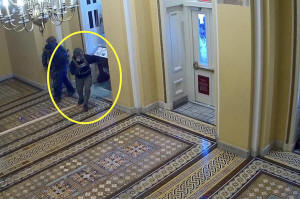Military veteran gets a life sentence for plotting an FBI attack after
his Jan. 6 arrest
[July 03, 2025]
By MICHAEL KUNZELMAN
WASHINGTON (AP) — A military veteran was sentenced Wednesday to life in
prison for plotting to attack an FBI office and assassinate law
enforcement officers in retaliation for his arrest on charges that he
was part of the mob that stormed the Capitol on Jan. 6, 2021, court
records show.
Edward Kelley was one of the first rioters to breach the Capitol. Nearly
two years later, Kelley made plans with another man to attack the FBI
office in Knoxville, Tennessee, using improvised explosive devices
attached to vehicles and drones, according to prosecutors.
Last November, a jury convicted Kelley of conspiring to murder federal
employees, solicitation to commit a crime of violence and influencing
federal officials by threat.
Kelley, 36, received a pardon from President Donald Trump for his Jan. 6
convictions, but a judge agreed with prosecutors that Trump's action did
not extend to Kelley's Tennessee case. That makes Kelley, who is from
Maryvale, Tennessee, one of only a few Capitol riot defendants remaining
in prison after the Republican president's sweeping act of clemency.
U.S. District Judge Thomas Varlan handed down Kelley's life sentence
during a hearing in Knoxville, according to court records. The judge
denied a request for Kelley to be released pending the outcome of an
appeal.
Prosecutors had recommended a life sentence for Kelley, saying he was
remorseless and incapable of rehabilitation.
“On the contrary, Kelley not only believes the actions for which he was
convicted were justified but that his duty as a self-styled 'patriot'
compelled him to target East Tennessee law enforcement for
assassination,” they wrote.

Kelley served in the Marine Corps for eight years. He was deployed to
Iraq and Afghanistan before his 2015 discharge from the military.
On Jan. 6, 2021, Kelley was captured on video helping two other rioters
throw a Capitol Police officer onto the ground and using a piece of wood
to damage a window, according to the FBI. He was the fourth person to
enter the Capitol through a broken window, the FBI said.
After a trial without a jury, a federal judge in Washington convicted
Kelley last November of 11 counts stemming from the riot. Before Kelley
could be sentenced, Trump pardoned him and hundreds of other convicted
Capitol rioters.
Kelley argued that his pardon was broad enough to cover his conduct in
the Tennessee case, but the judge disagreed. Varlan said Kelley's crimes
in the Tennessee case were separated from Kelley's conduct on Jan. 6 “by
years and miles.” Prosecutors reached the same conclusion.
[to top of second column]
|

This image from U.S. Capitol Police video, contained in the
statement of facts supporting the arrest warrant for Edward Kelley,
and annotated by the source, shows Kelley entering the U.S. Capitol
Jan. 6, 2021, in Washington. (Justice Department via AP)

In other Jan. 6 cases, however, Trump's Justice Department has
argued that the pardons apply to separate convictions. For instance,
prosecutors concluded that a Kentucky man's pardon for storming the
Capitol also covered his conviction for illegally possessing guns
when FBI agents searched his home for the Jan. 6 investigation.
Kelley has been jailed since December 2022. His lawyer, Mark Brown,
said Kelley did not hurt anybody or directly threaten anybody with
violence. Brown urged the judge to reject prosecutors' request to
apply a “terrorism enhancement” in calculating his client's
sentence.
“Kelley does not deserve the same sentence as an actual ‘terrorist’
who injured or killed hundreds or thousands of America citizens,”
Brown wrote.
Kelley's co-defendant, Austin Carter, pleaded guilty to a conspiracy
charge in January 2024. He is scheduled to be sentenced on Aug. 4.
Kelley created a list of 36 law-enforcement officers to target for
assassination and shared it with Carter, calling it their first
“mission,” according to prosecutors. All the officers were involved
in Kelley's May 2022 arrest on Capitol riot charges and the FBI's
search of his home.
“The proof at trial established that Kelley targeted law enforcement
because of their anticipated role in the civil war that Kelley hoped
to initiate and because of his animus towards those who participated
in his May 2022 arrest and search of his home,” prosecutors wrote.
Kelley, Carter and a third man used an encrypted messaging platform
to discuss plans, prosecutors said. Carter testified that he met
with Kelley to conduct military-style training in November 2022.
“Carter’s testimony was unequivocal — he had no doubts that, had he
and Kelley not been arrested, the law enforcement personnel included
on Kelley’s list would have been murdered,” prosecutors wrote.
Kelley's attorney said the case involved “little to no planning.”
“Discussions did not lead to action," Brown wrote. "And while people
may not like what Mr. Kelley had to say, he stands behind his
position that he has a First Amendment right to free speech.”
All contents © copyright 2025 Associated Press. All rights reserved
 |